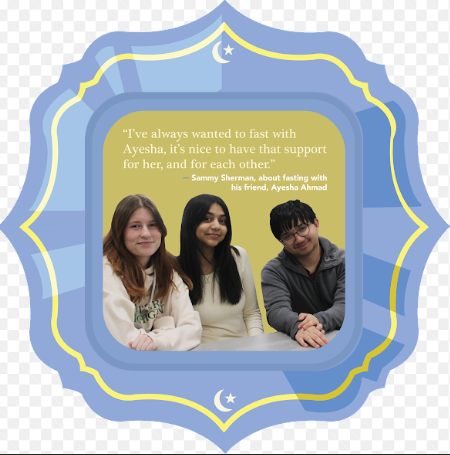Students fast for Ramadan to support friends
Aybika Kamil | The Chronicle
Non-Muslim Mason High School (MHS) students give Ramadan a try.
Considered to be the holiest month for Muslims, Ramadan is the ninth month of the Islamic calendar. Muslims fast from dawn to dusk daily, abstaining from drinking water and eating food to satisfy one of the five pillars of Islam, Sawm. They fast to cleanse their souls, empathize with the needy and grow closer to Allah.
MHS juniors Ava Plouffe and Sammy Sherman decided to fast in solidarity with their friend, junior Ayesha Ahmad, this month. While they are not fasting the whole month, Plouffe and Sherman plan to fast for a day with Ahmad. When it is Iftar, the time when fasts are broken, they hope to go out to eat and break their fasts together to celebrate.

“We’ve been friends since freshman year, I think it’ll be good to have that bonding moment and reliability,” Sherman said. “Even though you can’t eat or drink or chew gum or do anything, still having that support there is really good to get through the day.”
Sophomores Aasritha Adidamu and Anvita Budda have similar intentions for observing Ramadan with their friend, sophomore Rania Kabir. Adidamu said she and Budda wanted to be there for Kabir since they usually sit together at lunch and have numerous classes together.
“It’s about getting closer to the culture, but it’s also getting closer to your friend because we now form a different bond, such a close and tight bond,” Adidamu said. “I think as much as we get to learn about the culture, it’s also developing a connection with your friend.”
While this was their first time fasting for Ramadan, Adidamu and Budda had previous experience with another type of fasting. In their Hindu culture, Budda said they abstain from eating but they are able to drink water.
Plouffe and Sherman had fasted for a day the previous Ramadan as well, and Plouffe said they hope to continue this tradition.
“Next year I’m 100% going to do it, probably with Ayesha again,” Plouffe said. “I could definitely see this becoming something I do like every year, not for the entirety of Ramadan but just for like a day or two because I feel like it’s a really beneficial experience, whether religious or not.”
Adidamu and Budda’s experiences with fasting differed from what they had originally anticipated. Adidamu said she initially had concerns, thinking she would only be able to think about food and not be able to concentrate on work.
“I thought I was gonna be starving the entire day, but honestly it wasn’t that bad,” Adidamu said. “I expected to feel really hungry and focus on food throughout the day. But I was able to focus on my work and I was able to do whatever I was supposed to without feeling tired.”
Adidamu said being at school helped ease fasting and having friends around her to talk to aided in taking her mind off of food.
“Being at school, you have a ton of distractions around you,” Adidamu said. “I feel like this would be especially hard if I were home and just over the weekend.”
Budda recognized the difficulty that comes with fasting the whole month as opposed to fasting for a few days as she had. Budda said that the hunger builds up over time.
“I feel like it’s because we only [fasted] for one day and I had good food the day before that I didn’t really have that much excitement for Iftar,” Budda said. “But if I did it for a long time, then I feel like I’d be just waiting for Iftar to come the whole day.”
Similar to Budda, Plouffe said that her experience likely does not compare to fasting for an entire month and that she has gained respect for people who do.
“Fasting for the entirety of Ramadan would be very difficult and a round of applause to whoever does that,” Plouffe said. “I struggled enough doing it for one day and I drank so much water the next day, that’s insanely impressive.”
Through fasting for Ramadan, Plouffe said that she wanted to explore other cultures and respect traditions. With the widespread celebration of the holiday, Plouffe said she felt unity with others and gained respect for those fasting alongside her.
“I just thought it was really cool to be a part of something so much bigger than myself,” Plouffe said. “I felt kind of connected to not just [Ahmad] but like everyone else who was [fasting]. I was doing the same thing as millions if not billions of people were doing worldwide.”
Plouffe said that partaking in Ramadan was impactful to her own character. Regarding her personal development, Plouffe said fasting gave her a change in the perspective with which she viewed her life and the world.
“It really helped me grow as a person,” Plouffe said. “Even though it is such a short time, it made me realize how much I take things for granted and helped me become more thankful for the things that I’m so used to.”
In addition to the bond created with his friends, Sherman said his cultural awareness also grew from fasting for Ramadan. He said the experience helped him realize the variety in culture that exists, which is something he hopes to be able to appreciate more often.
“Fasting helps me get closer to my friends and it helps me learn through my experience about what other people in the world do and the diversity we have,” Sherman said. “I hope it helps me become a better person because I’m learning about other customs, norms and traditions.”
